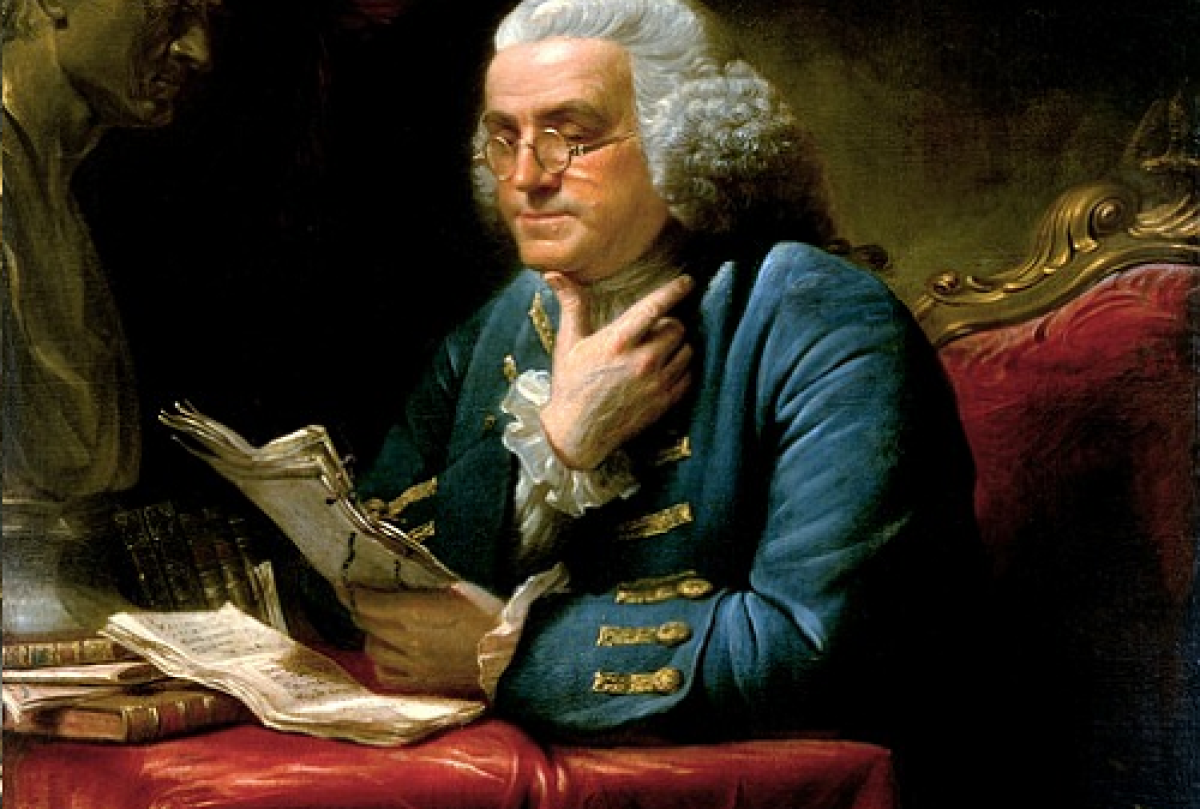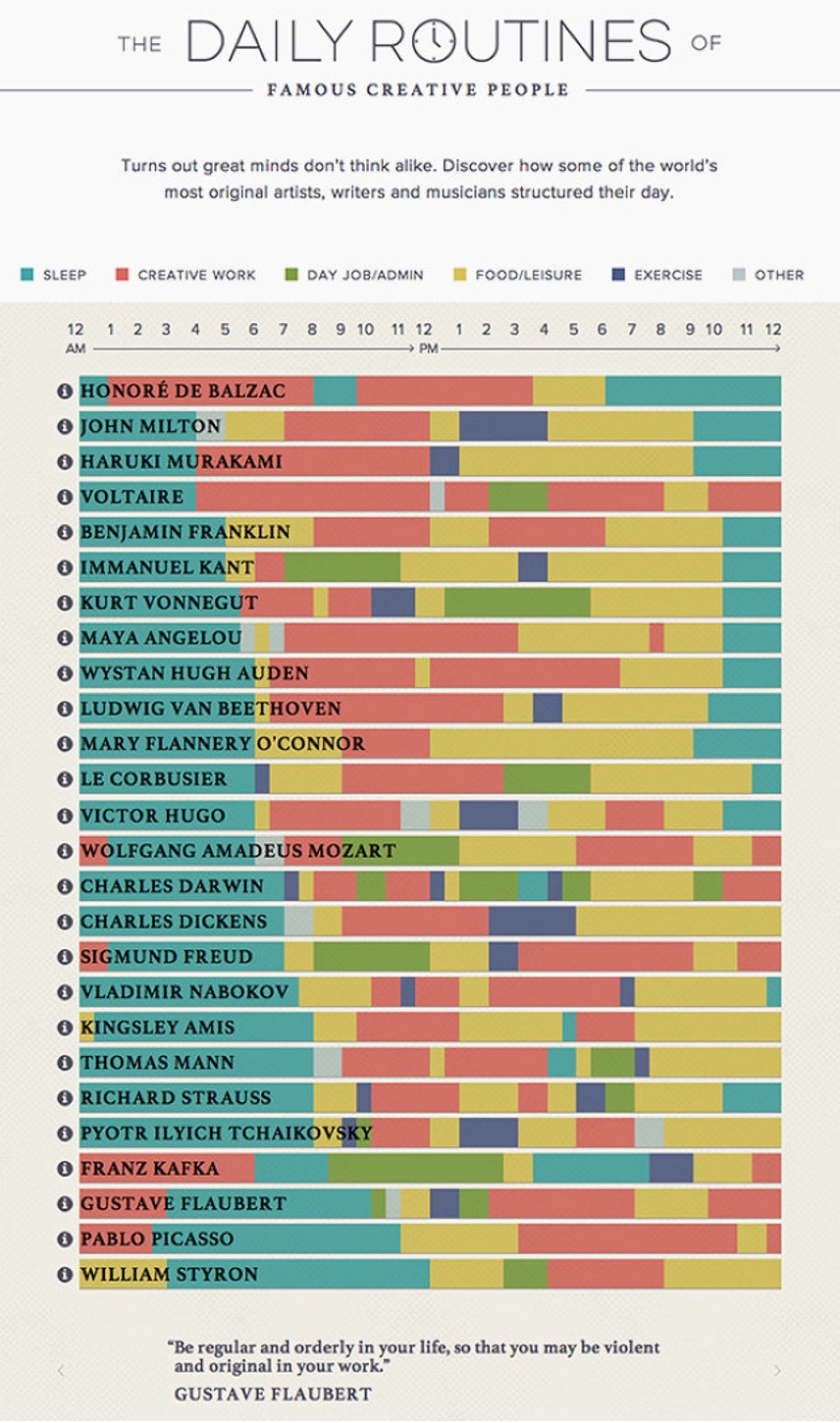13 Powerful Productivity Routines of High Achievers You Should Know About

“I write only when inspiration strikes. Fortunately, it strikes every morning at nine o’clock sharp.” — Somerset Maugham
The key to building successful businesses and achieving careers success is mastering productivity. After all, we all have exactly the same number of hours in the day in which to reach our goals. It is what we do, and how we do it that makes all the difference.
We reach excellence and peak productivity by focusing on the little patterns and routines that shape our daily lives. Peak productivity makes the difference between achieving greatness and simply getting through each day with mediocrity.
You might wonder: "How exactly can I shape my actions to boost productivity and ensure I achieve more in my life?" Well, make sure you establish consistent routines or rituals by scheduling and being regular and orderly in what you do.
Following a routine may sound boring, rigid and uncreative, but it’s extremely effective. It keeps you focused on your objectives and takes away the choice of showing up.
If there’s no question about whether you’re getting out of bed at 5 am or not, because it’s what you do every single day, then it becomes fairly easy to do it.
Massively creative people know this and use routines to wrangle their creative skills, rather than sit around waiting for inspiration to show up.

In the same way, successful entrepreneurs and high achievers in the world of business have routines that allow them to decide ahead of time what they are going to do, cause them to repeat productive behavior and accomplish their daily objectives.
With a routine in place, you'll get the work done at half the time because no time is wasted brooding or trying to figure out what to do next. You’ll be able to milk the systems that work and dramatically increase the amount you accomplish.
Checking every e-mail message as soon as it pops in your inbox is not a good routine. It distracts you from the task at hand and wastes time. Obviously, good routines will bring good results while bad routines will bring bad results.
Daily Routines of Highly Successful and Famous People
Here are some powerful daily routines of super successful creative people and high achievers you should probably emulate to boost your own productivity. Keep in mind that the habits you struggle with at first will only get easier as you continue to do them.
1. Get up early at the same time before 6 am—maybe eat the same breakfast every day.
Most high achievers jump out of bed early and use the early morning hours to jumpstart their day for success. Richard Branson attributes his successful running of over 400 companies to waking up with the sunrise at 5.45 am.
Branson explains in an interview that he also likes to incorporate a bit of music into his day.
2. Start the day with a workout session.
Barrack Obama starts his day with a workout at 6.45 am. Vigorous exercise stimulates endorphin production—a feel good hormone in the body. Exercise is also good for your heart and fitness, as well as for pumping more oxygen to the brain and improving your brain power.
After this great start, the former U.S president eats breakfast with his family and would usually get to the Oval Office at about 9 am.
3. Sit at the desk or stand in the studio at the same time every day.
In the book Haunted Heart: The Life and Times of Stephen King by Lisa Rogak, King explains his routine this way: “There’s a certain time I sit down, from 8:00 to 8:30, somewhere within that half hour every morning.”
King continues: “I have my vitamin pill and my music, sit in the same seat, and the papers are all arranged in the same places. The cumulative purpose of doing these things the same way every day seems to be a way of saying to the mind, you’re going to be dreaming soon.”
4. Set a simple target for each day.
When author John Grisham began writing, he still had his day job as a lawyer. To do both, he would wake up at 5:00 am, shower, and then head to work. He had set himself a simple target—to write one page each day.
Sometimes this page appeared in just ten minutes, while other days it took one or two hours. Regardless, he stuck to his routine and finished that page before he started his day’s work as a lawyer.
Jean Plaidy managed 5,000 words before lunch, and then spent the afternoon answering fan mail. A simple target keeps you focused and ensures you are making steady progress.
5. Take frequent, well-timed breaks in-between work.
Ludwig van Beethoven created immortal music following a routine that started at dawn with a cup of coffee. He would then work till 3 pm with frequent, well-timed breaks that included a small break for lunch followed by a midday walk.
Beethoven never composed music in the evenings – this was done in the earlier part of the day when he was at his peak energy and most creative.
Recent studies show that working in 90 minute blocks with 10 minute intervals to recover and refuel is a game-changing move.
6. Read something helpful for your career each day.
Warren Buffett’s daily routine includes a lot of reading and deep thinking. He spends about 80% of his day reading. All this reading and thinking has one single focus—to be the greatest investor of all time.
When asked in a TV show how to get smarter, he held up a stack of paper and said. “Read 500 pages like this every day. That’s how knowledge builds up, like compound interest.”
Bill Gates is also an avid reader. He says he reads for about an hour each night before bed and has been doing so since he was a kid. In deed, reading is to the mind what exercise is to the body.
7. Take a 30-minute walk every day, or just walk the dogs.
Having been an avid hiker in his younger years, Charles Darwin’s routine incorporated a lot of walking. He would start off the day with a short walk, followed by breakfast. And then he would work through the morning till lunch at 12:45.
Darwin is not alone in this habit. Acclaimed fashion designer and film director Tom Ford explained his day's schedule to Harper Bazaar saying, "I walk the dogs around Grosvenor Square and then head up to bed. Believe it or not, I usually take another hot bath and wash my face. Then we watch a bit of television (usually things we have recorded) or read and go to sleep."
8. Unplug from technology, and definitely cut back on TV.
Arianna Huffington, the founder of the HuffPost, is a staunch evangelist for sleep and “unplugging.” She says every night before bed she puts her phone in another room so that she is not distracted by it.
Sheryl Sandberg, Facebook's former chief operating officer (COO), also says she turns her phone off at night so that she “won’t get woken up.”
Studies show the light from our devices like iPads, laptops, and TVs interfere with production of the sleep hormone melatonin. Banning electronic gadgets from the bedroom helps in getting a good night’s sleep, and an even more productive day tomorrow.
9. Revisit the day’s events to see if you’ve achieved goals from the morning.
Benjamin Franklin—the original guru of productivity—woke up at 5 am each day to ask himself, “What good shall I do this day?” He ended his day by asking himself, “What good have I done today?”
That routine helped him stay focused on his singular objective—doing the most good each day.
10. Sleep the same hours each night.
Ben Franklin slept at 10 pm and woke at 5 am each day, getting seven hours of sleep per night. He is famously quoted saying, “Early to bed and early to rise makes a man healthy, wealthy and wise.”
Professor Mihaly Csikszentmihalyi, author of the book Flow, writes that politicians can train themselves to sleep fewer hours per night, but creative people should avoid this as too little sleep reduces their originality!
Get six to eight hours of shuteye daily, at least. If you don’t get enough sleep, you’re hurting your productivity and hindering your chances of success.
11. Stay in bed and work from there for a few hours.
Winston Churchill had a fairly unusual approach as far as high achievers go. Most high achievers jump out of bed early. Not Churchill. He didn’t physically get out of bed until about 11 am.
Although Churchill didn’t get out of bed till 11 am, he used those morning hours between 7 am and 11 am to do his most important decision-making and work lying down, including reading papers to catch up on local news, dictating letters and speaking with secretaries. He would also routinely take a solid 1-2 hour nap in the afternoon.
12. Practice meditation or engage in a spiritual practice.
Oprah Winfrey says she unwinds at the end of a stressful day with a focused meditation session. Padmasree Warrior, former Chief Technology & Strategy Officer of Cisco Systems and Motorola, Inc., also meditates every night.
Warrior told The New York Times back in 2012 that taking time to meditate and unplug keeps her calm and helps her manage the pressure of her work.
Mahatma Gandhi started his day at 4 am followed by his prayers at 4:20 am. He would then do a bit of writing, after which he’d work or rest.
13. Write down three things to accomplish the next day.
Kenneth Chenault, former CEO and Chairman of American Express, ends his day by writing down three things he wants to accomplish the next day right before retiring to bed.
Chenault says that in doing so he is able to wake up the next day and get straight to work on his most important tasks.
These are just some high achievers and their daily routines. What’s your daily routine like? Share with us on social media.
See Also: 9 Things Exceptional Writers Habitually Do So Well.




















